Can you work remotely from Portugal?
The short answer is yes indeed you can, however, you will have to be in compliance with the laws of Portugal. There is a detailed section about visas to work remotely from Portugal further down on this page.
On top of the legal side of things, to fully enjoy Portugal as a remote worker for a foreign company it would be better for you if you could learn a couple of important things about Portugal. All these things we have covered in this article, I hope you will enjoy it.
Portugal for digital nomads at a glance
The good
- Laid-back lifestyle
- Affordable for Western Europe
- Beautiful coastline
The bad
- Getting busier by the year
- Occasionally cold and wet winters
- Some pollution in the sea near major towns and cities
An introduction to Portugal
Just a mention of Portugal conjures images of blue-tiled churches and gold-tinged sands. Sat at the tip of Europe where the Atlantic Ocean roars against the rocks, it’s a country that’s long allured visitors.
In more recent decades, it’s also been established as a haven for remote workers. A lot of effort has gone into bulking up the digital infrastructure, speeding the internet, and giving a good platform for creative start-ups, of which there are now hundreds.
Largely speaking, the nomad communities of Portugal are roughly divided in two between Porto (in the north) and Lisbon (the capital).
They have a healthy rivalry, but are actually quite similar, with surf beaches on the doorstep, rattling vintage trams, and rollicking party districts up their sleeve.
Beyond the towns is a world that’s still being discovered by more adventurous DNs. From the salt-sprayed beaches of the Silver Coast to the fishing towns of the Algarve to the remote Schist Villages in the mountainous interior, there are lots to get through!
Connectivity in Portugal
The internet has come on leaps and bounds in Portugal in recent decades. There was a time when connections here moved slower than an Alentejo farm donkey. No longer. It’s quick and improving, while mobile coverage is also on the up…
WiFi in Portugal
Portugal achieves a respectable 24th place in the world for average broadband speeds. Median peaks nationwide hit over 100 Mbps download and nearly 50 Mbps upload.
In practice, stats show that actual use puts connections at close to the 10 Mbps mark in cities like Porto and Lisbon, with considerable dips when you move out to the islands of the Azores and Madeira or more rural provinces.
It’s really uncommon to find digital nomad accommodation in Portugal that doesn’t have its own internet connection.
In fact, these days, it’s normal for hosts to include a screen capture of a speed test in their listings. If you don’t see one, that’s an acceptable request to make before booking.
| Portugal City | Average Download speed | Average Upload speed |
| Lisbon | 8.32 Mbps | 4.16 Mbps |
| Ponta Delgada, Azores | 1.69 Mbps | 0.97 Mbps |
| Portimão | 6.64 Mbps | 1.86 Mbps |
| Porto | 58 Mbps | 36 Mbps |
| Aveiro | 5.32 Mbps | 1.90 Mbps |
| Braga | 6.28 Mbps | 3.51 Mbps |
| Coimbra | 6.48 Mbps | 3.05 Mbps |
| Funchal, Madeira | 7.89 Mbps | 2.96 Mbps |
4G and mobile in Portugal
Portugal has slipped recently in the global rankings of mobile internet speeds, down to 43rd in the world overall. But that’s still a good place to be, with roundabout downloads from your smartphone sitting at 35 Mbps with pings of just 31ms.
Coverage of mobile networks is another issue entirely. If you stick to big towns like Porto and Lisbon, you’ll be fine. Venture beyond those, particularly into the Douro Valley or the Serra da Estrela in the east, and you’ll see changes to 3G or drops in connection altogether.
MEO and Vodafone are the two most popular options for short-term SIMs in Portugal. You’ll find a stall selling those at most major international airports.
If you have a phone compatible with e-sims, you can even subscribe to MEO e-sim prepaid plan through the app called Airalo. It offers 30GB of data for a period of 15 days.
| Portugal City | 4G Coverage |
| Lisbon | 4G covered |
| Ponta Delgada, Azores | 4G partially covered |
| Portimão | 4G covered |
| Porto | 4G covered |
| Aveiro | 4G covered |
| Braga | 4G covered |
| Coimbra | 4G covered |
| Funchal, Madeira | 4G covered |
How to travel around Portugal and keep a good Internet connection?
If you are more of an adventurous digital nomad and if you wish to travel to different places in Portugal while working remotely you will have to rely on the 4G network as some of the Airbnbs, or hotels you will be staying in will have poor WiFi network.
To make sure you will be able to work remotely from the most bucolic areas, I suggest you use Nperf.com to check on the 4G network coverage.
Let’s say you wish to spend some time next to Lagos, where you’ll find some of the most beautiful beaches in Portugal, you should check the area with Nperf.com, and make sure that your accommodation is located somewhere where the 4G is covered.
On Nperf.com maps, two types of 4G networks are displayed:
- 4G – in orange
- 4G+ – in red
4G networks are usually quite unstable (not reliable for video calls) but provide a decent speed (about 10Mbps) if the signal is strong enough.
4G+ networks are very fast and stable. They could be compared to fiber-optic networks.
Portugal Remote Work Visas
There are no such things as a digital nomad Visa in Portugal. There are several options you will need to evaluate depending on your own situation, the type of work you are doing, the reasons why you wish to work in Portugal, and how long you are planning to stay.
As Portugal is a member of the EU and the Schengen Zone, its general tourist visas are the same as 26 other countries across the continent.
The vast majority of casual remote workers you’ll meet here are likely to be using the 90-day Schengen Visa, which allows for three-month stays within any six-month period.
Be wary of going down that route: The Schengen Visa is intended for leisure travel only.
If you’re planning on setting up shop and settling, there are better alternatives:
Golden Visa (also known as ARI)
DNs with a bit of capital behind them might like the sound of the so-called Golden Visa.
It’s open to anyone who makes a large investment in Portugal, either through property, business, or stocks and shares funds.
Sadly, the minimum amount you’ll need for this is around €125,000 ($135,000), which discounts a whole load of nomads.
D7 Passive Income
The D7 visa covers anyone who earns a stable income from passive means. Values in the region of €20,000 per annum are needed to qualify.
Often used by pensioners and second-home owners, but could also apply to nomads who are experts in the affiliate field.
Portugal Entrepreneur Visa (also known as the Portugal StartUP Visa)
Intended for start-ups with a business plan behind them, the Portugal Entrepreneur Visa requires applicants to establish an enterprise within the country.
Beware that checks are stringent, and you can’t just come up with any old “new idea”. The purpose is to attract real industry disruptors and innovators.
Portugal Self Employment Visa
Portugal has a visa designed specifically for self-employed workers.
There’s one catch – the application requires you to prove that you have made efforts to work and provide services for native Portuguese companies.
Benefits are many, ranging from the right to access national healthcare to free travel throughout the Schengen Zone.
For digital nomads based in the European Union, things are a lot simpler. You already have the right to live, work and travel throughout Portugal however much you like.
If you come for longer than a few months, you will need to apply for a residency permit and register for tax purposes. But that’s it.
Where to apply for your Visa?
Be careful, there are websites ranking high on Google search results pages for keywords such as “D7 visa Portugal”, or “Golden visa Portugal”, presenting themselves as official websites, but they are not.
They are just travel agents offering you the service to manage your Visa application. A service that could be very helpful, but a service you will have to pay for, indeed.
If you wish to get the right information directly from the official Portuguese website, just click here or search for vistos.mne.gov.pt in your preferred search engine.
Where to work as a digital nomad in Portugal
There are more places to work for digital nomads in Portugal than you can shake a sweet pastel de nata tart at. Yep, this café-mad country touts sandy beach bars, mountain lodges, sleek inner-city coworking spaces, and much more for the laptop-based pioneer. Let’s take a look…
Co-working spaces
Some of the very first successful co-working spaces in all of Europe began in Lisbon.
The likes of Cowork Central and Rocket Hub (just check out those river views!) are now breaking the mold, offering bright, airy, and downright bohemian offices where all sorts of nomads come to tap away at the laptop and network while they’re at it.
Porto is no different, although Porto i/o is the legend that usually tops the list.
Surf camps

It’s no secret that Portugal is a surf mecca. There are countless surf camps and beach lodges that offer access to the breaks, from the Algarve to the wild north coast.
A more recent phenomenon is the coupling of co-working and surf camps into one. Surf Office is a prime example, with its network of beach-side homes that are perfect for corporate retreats and wave-loving nomads.
Cafés
Whether you’re in a small village or a big city, you’re never likely to be far from a top-class café in Portugal. Lots of these – especially in districts like Vitória in Porto and Baixa-Chiado in Lisbon – are used to seeing nomads drop in for coffee, brunch, and a working session.
However, you’ll also find that these sorts of venues are often reserved for chilling and socializing. You might get a few glares by bringing work into the environment if you pick the wrong place, or simply have trouble finding speedy WiFi and a place to sit!
Tech stuff for digital nomads in Portugal
Before packing your bags and booking that flight to Lisbon, be sure to check out this section of our digital nomad guide to Portugal. It’s got the lowdown on the plugs, converters, and another tech you might need to consider before jetting down to the waves.
Plugs and things in Portugal
Portugal’s mains connections operate at 230V on 50Hz. The wall sockets can be used with Type C and Type F plugs, which are both two-pronged and round. That puts them in line with the rest of Europe, so an adapter that works in Poland or Germany will also be fine here.
Security and accessibility
Portugal has a good record when it comes to internet freedoms – it’s all part of the country’s new image as an open-source tech haven. There are no reports that the government limits URLs or monitors internet activity in the country.
In addition, the nation’s constitution expressly guarantees freedom of speech and freedom of the press. You’re not likely to encounter any problems on this front.
Repairs and computer shops
You’ll likely need to ditch the surf beaches and make for the nearest city or town if you do need a repair shop. There are general ironmongers with plugs and adapters in most tourist areas, but Apple stores and the big tech warehouse sellers are limited to places like Lisbon and Porto, Coimbra, and Lagos.
Cost of living in Portugal
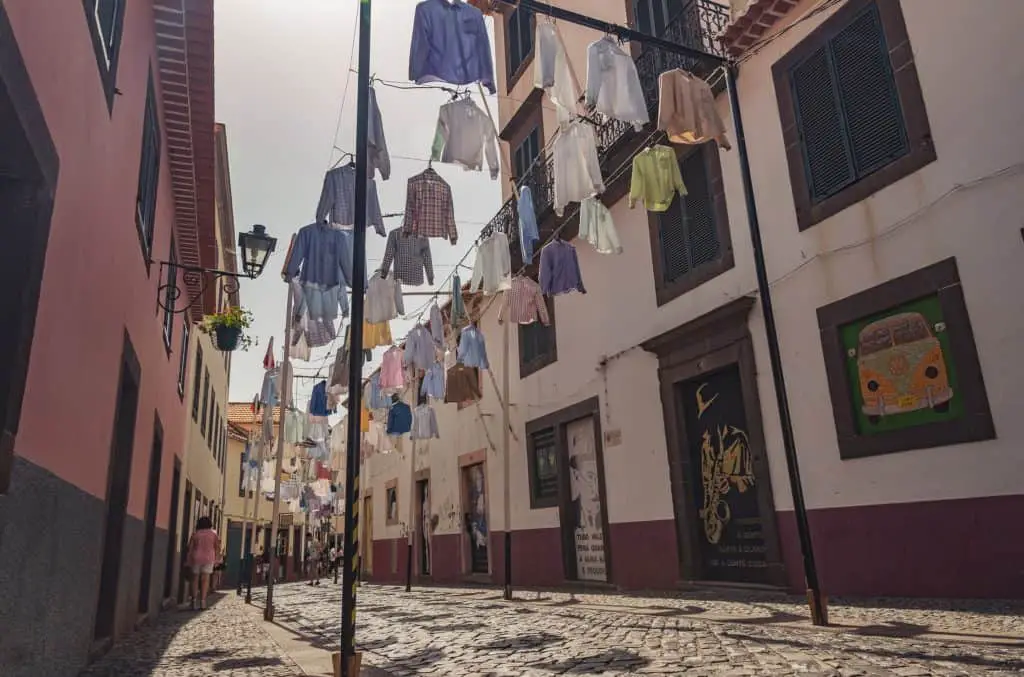
Portugal is surprisingly cheap compared to its Western European compadres. Estimations put monthly costs at around the $2,000 mark, which includes everything from rent to travel costs.
The most expensive region overall is typically the Algarve in the south, on account of its popular beach resorts and hotels, which attract thousands of visitors between May and October each year.
Head north of Lisbon or inland to the less-explored Schist Villages and things get cheaper, with average monthly outgoings dipping to around $1,500-1,700 per month.
| Portugal City | Cost of living |
| Lisbon | ~$2,200 per month |
| Ponta Delgada, Azores | ~$2,329 per month |
| Portimão | ~$635 per month |
| Porto | ~$2,130 per month |
| Aveiro | ~$2,200 per month |
| Braga | ~$2,253 per month |
| Coimbra | ~$2,139 per month |
| Funchal, Madeira | ~$2,329 per month |
Accommodation for digital nomads in Portugal
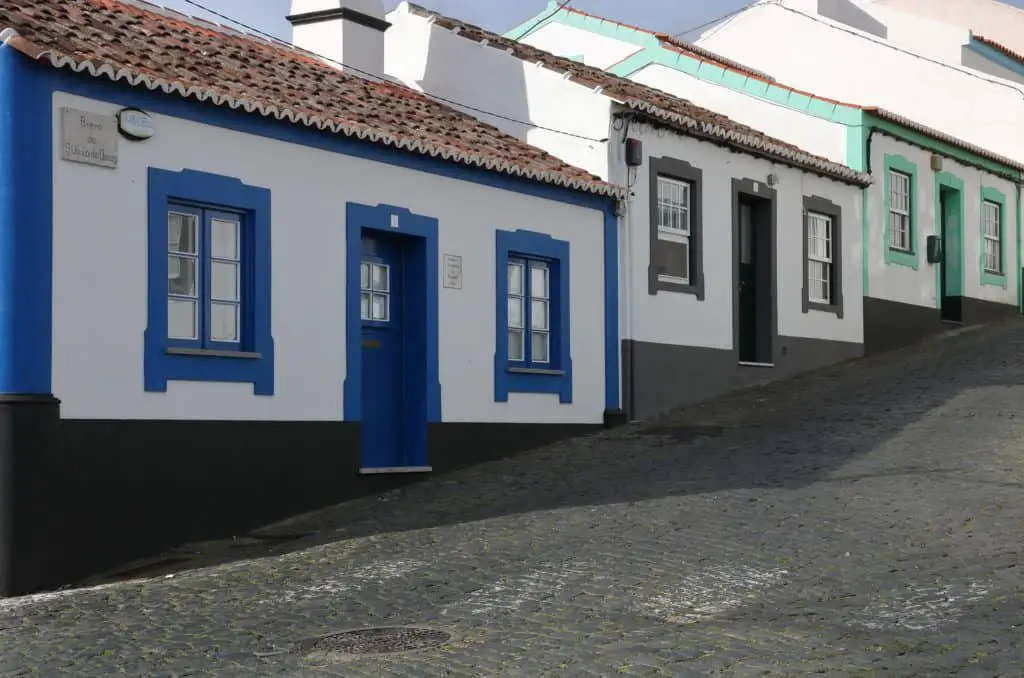
Portugal is such a big draw for holidaymakers, sun lovers, and surfers that you’re sure to find myriad options on the accommodation front.
Whether it’s an inner-city apartment gazing down at Lisbon’s tile-fronted townhouses or a beach-side pad by the waves of Ericeira you’re looking for, start that search using the tools below…
Airbnb
It’s estimated that there are over 8,000 private rental properties up for grabs in Porto and the surrounding region, and nearly double that in Lisbon.
In fact, there have been recent complaints that both of Portugal’s top two cities are going the way of Dubrovnik and Barcelona, with overloads of short-term rentals taking over the center…
Still, that’s good news for digital nomads, who can often score well-placed flats and condos with good monthly discounts (only available to those booking for 28 days or more).
Always be sure to watch out for cancellation policies that will penalize you for changing plans at the last minute. Oh, and try to book in advance if you’re traveling from May to October (it’s high season then).
Flatio
An alternative to Airbnb monthly bookings could be Flatio. It specializes in long-term rentals. Only fully furnished apartments are listed there.
It is also used by people who don’t want to go through the traditional process when renting an apartment.
Nomads seem to find cheaper prices on this website.
NomadX
NomadX is a Portugal-based start-up that aims to make short- to long-term lettings available all over the country.
It’s got a growing database of listings but is largely focused on the DN hotspots of Lisbon and Porto, along with a few of the surf and beach towns between the two.
Prices tend to be a little lower than on Airbnb, with more direct contact with renters allowed through the platform. (Bonus: There’s also a ready-made nomad community to match over on the NomadX Facebook.)
Portugal is a rising star in the digital nomad world. New changes to visas and a determination to pull internet speeds in the 21st century have converted cities like Porto and Lisbon into real location-independent hubs.
That said, you’ll still find adventure and remoteness in the backcountry, where nomad surf camps and mountain ranges abound.
Travel basics for Portugal
Language
Portuguese is the official and main language spoken in Portugal. Contrary to common belief, it’s not too similar to Spanish but has heavy vowel use and phonology that’s more in line with French.
An estimated 20%-30% of the Portuguese population speaks English either fluently or at an advanced conversational level. In addition to that, there are some local dialects to watch out for, such as Mirandese, which is predominantly spoken in the deep east of the Douro Valley.
| Portugal City | English? |
| Lisbon | English friendly |
| Ponta Delgada, Azores | English friendly |
| Portimão | English friendly |
| Porto | English friendly |
| Aveiro | English friendly |
| Braga | English friendly |
| Coimbra | English friendly |
| Funchal, Madeira | English friendly |
When to visit Portugal?

One thing that really helps Portugal stay attractive to travelers and digital nomads alike is the climate. It’s considered one of the very best in Europe, with cool winters and hot summers that are tempered by the soothing Atlantic breezes along the coast.
Generally speaking, the best time to come is during the summer, but there’s something particularly nice about the shoulder seasons of spring and autumn (April and May, and September and October) when there are fewer tourists around.
The winters in Portugal can be wet, so you might want to set your compass south to the Algarve between November and March. That region still gets reliable sun and regular average temperatures around 16 Celsius (60 F).
Food

Seafood is the jewel in the crown of Portuguese cuisine. Up north, salt cod is served in hearty pies with mashed potato and organic veggies. Down south, there are rich tomato stews packed with prawns and mussels.
Sardines are one of the most famous dishes on the roster. Try to hit Lisbon for the Feast of St Anthony in June to taste them at their very best; served with a slice of lemon straight from a sizzling BBQ grill in the Alfama district.
Meat eaters also won’t be disappointed. They can sample huge francesinha sandwiches (Porto’s specialty) – stacked layers of steak, spicy sauce, and melted cheese. Then comes the filling cozido stew, packed to bursting with smoked sausages and farm veggies.
Where do digital nomads love to stay in Portugal?
Portugal has loads going for it. Culturally rich and steeped in tales of great global explorers, it’s a land where centuries-old churches mingle with vast palazzos.
Couple that with 1,115 miles of coastline, ranging from crashing waves on the Atlantic to golden beachfront on the Algarve, and a wild inland of mountains and lonely village communities, and you start to get a picture of just how enticing this corner of Europe can be.
Here are just a few spots that digital nomads looking Portugal’s way might want to consider…
Lisbon

Big, fantastically fun, and with all the amenities you could want as a digital nomad in Portugal, the city of Lisbon is a great first port of call for remote workers.
This is where all the government offices are located, so it should be easy to sort those visas and registrations and whatnot. It’s also the stomping ground of vibrant districts like the Bairro Alto (go there for wild nightlife bars) and the Alfama (check that one out for sardine BBQ restaurants and atmospheric narrow alleys).
Downside? Rent in Lisbon can be high, so consider checking out stays in lesser-known neighborhoods like Martim Moniz or Intendente.
Porto
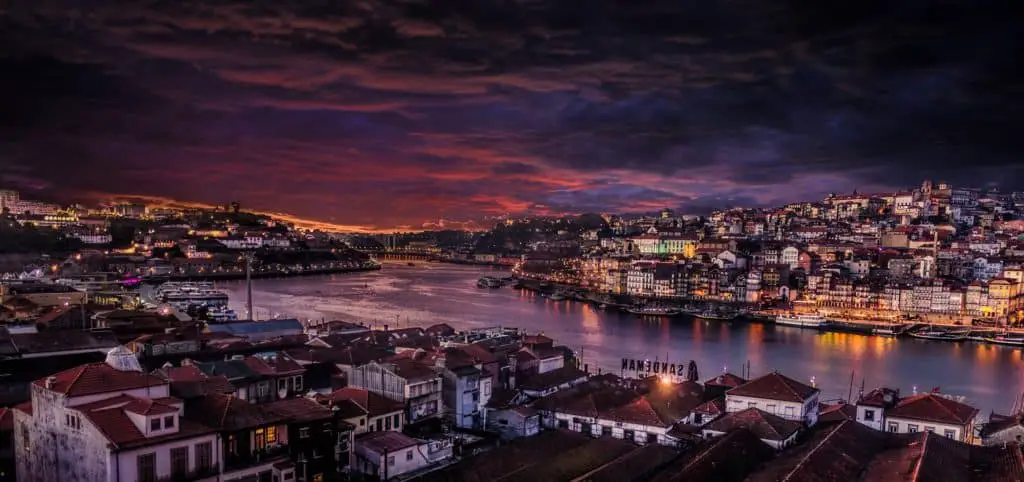
Porto is a chart-topper of a city. Compact but with all the boldness of a metropolis, it spreads over the green banks of the Douro River through UNESCO old areas and wrought-iron bridges.
The World Heritage area of Ribeira might be the focus for tourists coming for just a day or two, but digital nomads might prefer the likes of café-filled Vitória or even Matosinhos, right on the coast.
Coimbra

Coimbra has the distinction of being the ancient capital of Portugal. A gorgeous old city that’s laced with cobbled lanes and little plazas, it’s certainly one for the Instagram influencers out there.
Much smaller than both Porto and Lisbon, it’s got a chilled vibe and loads of heritage up its sleeve.
Downsides include the distance from the coast – the surf towns of Buarcos and Figueira da Foz are at least 45 minutes driving to the west – and the summertime crowds of day-trippers.
Peniche
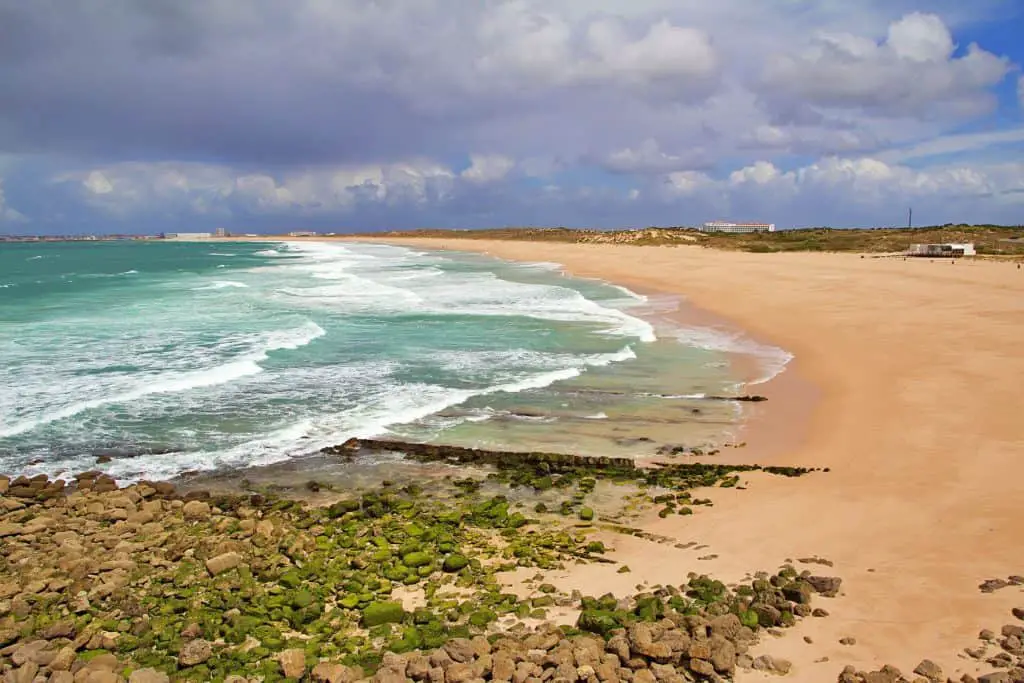
Peniche surf is some of the very best in the country. Beginners and pros alike flock to this gritty and salt-washed town on the Atlantic throughout the year to ride the waves.
In recent times, it’s also become a favorite beach getaway from Lisbon (the capital is less than 1.5 hours by bus).
The little village of Baleal sits along the shoreline to the north, offering quaint fishing taverns and sea-view cafes.
However, it’s Peniche town and the Supertubos beach that has the energy. Head to those to find quaint coast apartments and lots of nightlife.
Sagres
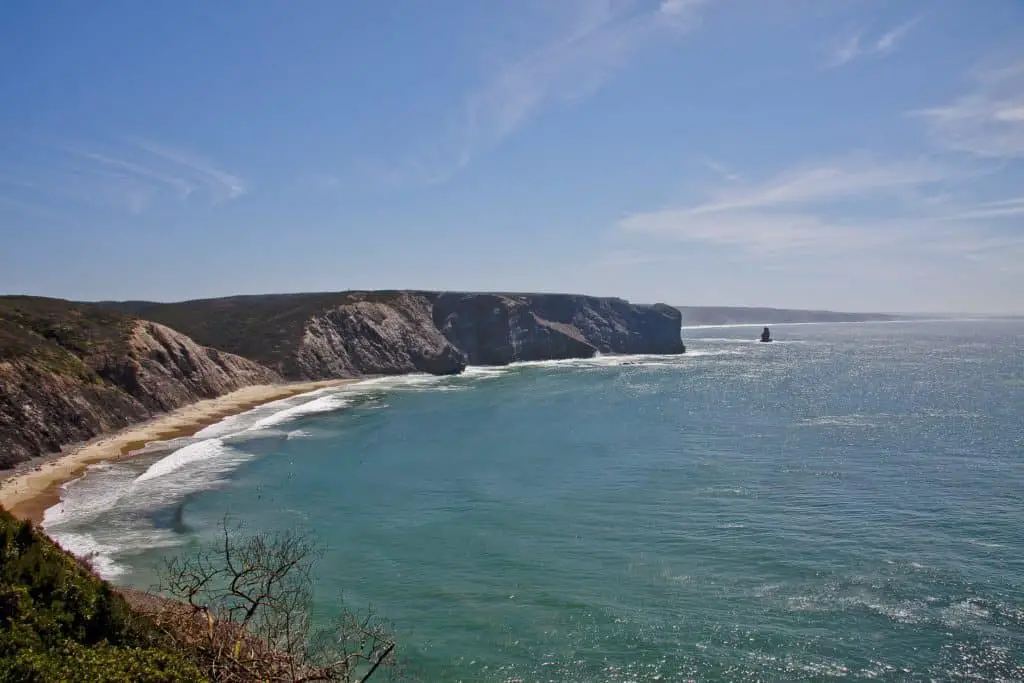
You’ll discover Sagres, in Faro district, jutting its nose out into the Atlantic Ocean on the far southern edge of Portugal.
It’s a laid-back surf town at heart, with beaches strung to its west that are perfect for sunbathing, and others to the north that boast some of the most reliable waves in the country.
Accommodation tends to be in condos or classic Iberian cottages painted white, but you might also catch the odd surf camp and DN co-living project in the surrounding province.
Can you work remotely from Portugal?
The short answer is yes indeed you can, however, you will have to be in compliance with the laws of Portugal. There is a detailed section about visas to work remotely from Portugal further down on this page.
On top of the legal side of things, to fully enjoy Portugal as a remote worker for a foreign company it would be better for you if you could learn a couple of important things about Portugal. All these things we have covered in this article, I hope you will enjoy it.

